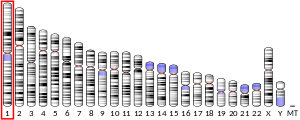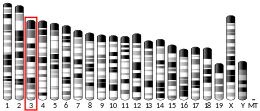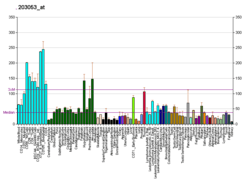BCAS2
Pre-mRNA-splicing factor SPF27 is a protein that in humans is encoded by the BCAS2 gene.[5][6][7]
References
- 1 2 3 GRCh38: Ensembl release 89: ENSG00000116752 - Ensembl, May 2017
- 1 2 3 GRCm38: Ensembl release 89: ENSMUSG00000005687 - Ensembl, May 2017
- ↑ "Human PubMed Reference:".
- ↑ "Mouse PubMed Reference:".
- ↑ Neubauer G, King A, Rappsilber J, Calvio C, Watson M, Ajuh P, Sleeman J, Lamond A, Mann M (Oct 1998). "Mass spectrometry and EST-database searching allows characterization of the multi-protein spliceosome complex". Nat Genet. 20 (1): 46–50. doi:10.1038/1700. PMID 9731529.
- ↑ Nagasaki K, Maass N, Manabe T, Hanzawa H, Tsukada T, Kikuchi K, Yamaguchi K (Aug 1999). "Identification of a novel gene, DAM1, amplified at chromosome 1p13.3-21 region in human breast cancer cell lines". Cancer Lett. 140 (1–2): 219–26. doi:10.1016/S0304-3835(99)00091-9. PMID 10403562.
- ↑ "Entrez Gene: BCAS2 breast carcinoma amplified sequence 2".
Further reading
- Ewing RM, Chu P, Elisma F, et al. (2007). "Large-scale mapping of human protein-protein interactions by mass spectrometry". Mol. Syst. Biol. 3 (1): 89. doi:10.1038/msb4100134. PMC 1847948. PMID 17353931.
- Gregory SG, Barlow KF, McLay KE, et al. (2006). "The DNA sequence and biological annotation of human chromosome 1". Nature. 441 (7091): 315–21. doi:10.1038/nature04727. PMID 16710414.
- Qi C, Zhu YT, Chang J, et al. (2005). "Potentiation of estrogen receptor transcriptional activity by breast cancer amplified sequence 2". Biochem. Biophys. Res. Commun. 328 (2): 393–8. doi:10.1016/j.bbrc.2004.12.187. PMID 15694360.
- Gerhard DS, Wagner L, Feingold EA, et al. (2004). "The status, quality, and expansion of the NIH full-length cDNA project: the Mammalian Gene Collection (MGC)". Genome Res. 14 (10B): 2121–7. doi:10.1101/gr.2596504. PMC 528928. PMID 15489334.
- Strausberg RL, Feingold EA, Grouse LH, et al. (2003). "Generation and initial analysis of more than 15,000 full-length human and mouse cDNA sequences". Proc. Natl. Acad. Sci. U.S.A. 99 (26): 16899–903. doi:10.1073/pnas.242603899. PMC 139241. PMID 12477932.
- Scherl A, Couté Y, Déon C, et al. (2003). "Functional proteomic analysis of human nucleolus". Mol. Biol. Cell. 13 (11): 4100–9. doi:10.1091/mbc.E02-05-0271. PMC 133617. PMID 12429849.
- Lee S, Ha S, Chung M, et al. (2003). "Mouse DAM1 regulates pro-apoptotic activity of BLK in mammary epithelial cells". Cancer Lett. 188 (1–2): 121–6. doi:10.1016/S0304-3835(02)00055-1. PMID 12406557.
- Maass N, Rösel F, Schem C, et al. (2002). "Amplification of the BCAS2 gene at chromosome 1p13.3-21 in human primary breast cancer". Cancer Lett. 185 (2): 219–23. doi:10.1016/S0304-3835(02)00286-0. PMID 12169396.
- Suzuki Y, Yoshitomo-Nakagawa K, Maruyama K, et al. (1997). "Construction and characterization of a full length-enriched and a 5'-end-enriched cDNA library". Gene. 200 (1–2): 149–56. doi:10.1016/S0378-1119(97)00411-3. PMID 9373149.
- Maruyama K, Sugano S (1994). "Oligo-capping: a simple method to replace the cap structure of eukaryotic mRNAs with oligoribonucleotides". Gene. 138 (1–2): 171–4. doi:10.1016/0378-1119(94)90802-8. PMID 8125298.
External links
- BCAS2 human gene location in the UCSC Genome Browser.
- BCAS2 human gene details in the UCSC Genome Browser.
This article is issued from
Wikipedia.
The text is licensed under Creative Commons - Attribution - Sharealike.
Additional terms may apply for the media files.




